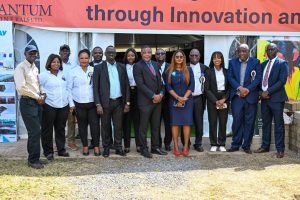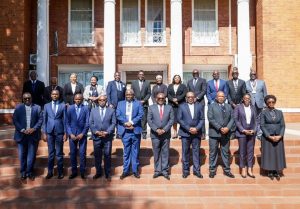We the designated Ministers responsible for wildlife management in the
Kavango Zambezi (KAZA) Transfrontier Conservation Area (TFCA) Partner
States of Angola, Botswana, Namibia, Zambia, and Zimbabwe, convened
today on 31st August 2023 in Livingstone, Zambia, to launch the much-
anticipated 2022 KAZA Elephant Survey report.
The KAZA Elephant Survey is a strategic activity of the 2019 KAZA Strategic
Planning Framework for the Conservation and Management of Elephants. This
framework seeks to harmonise Partner States’ efforts in the management of
KAZA’s globally significant contiguous elephant population. KAZA holds over
50% of African Savannah elephants, which is the largest single elephant
population in the world.
In April 2019, Partner States directed the KAZA Secretariat to mobilise resources
to conduct the first-ever, synchronized KAZA Elephant Survey. This directive was
subsequently reaffirmed and amplified by the KAZA Heads of State during the
Kasane Elephant Summit of 7th May 2019, centered on the theme “Towards a
common vision for management of our elephants.”
Among the resolutions of the Kasane Elephant Summit was a commitment to
conduct transboundary and synchronised KAZA wide aerial surveys of
elephants and other wildlife populations according to standardized
methodologies, ensuring comparability across the landscape.
Key to the survey was the collective commitment to a robust scientific process
in pursuit of a credible survey outcome. We are pleased to report that the
survey design and approach conform to the Convention on International
Trade in Endangered Species of Wild Fauna and Flora (CITES) Monitoring of
Illegal Killing of Elephants (MIKE) Aerial Survey Standards.
2. The survey results, when compared with previous surveys, reflect a stable
population – with a net effect of increases, stability, and possible decrease in
different parts of the survey area.
We highlight the following key insights of the survey:
i. Population Estimate: the survey estimated an elephant population of
227,900 (±7%) – this is an increase of over 10,000 compared to the results
from the 2016 IUCN African Elephant Status Report.
ii. Precision: A percentage relative precision of 7.34% was achieved for
the elephant estimate, indicative of a sound survey design.
iii. Elephant Carcasses: The overall carcass ratio is 10.47% which is
suggestive of a high level of mortality. This underscores the need for
further investigation and analysis, and strengthening of current and
future efforts to address unnatural mortalities.
iv. Other Wildlife and Livestock: The survey also produced population
estimates for other species such as buffalo, giraffe, hartebeest,
hippopotamus, impala, roan, sable, wildebeest, and zebra. Importantly,
estimates of domestic livestock herds reflected a ratio of wildlife to
domestic stock approaching parity – highlighting growing pressures on
water and rangelands and the significance of measures to promote
integrated landuse planning, co-existence and cross-sectoral policy
harmonization.
Beyond being a scientific milestone achieved within budget and schedule, this
survey provides invaluable insights for the coordinated management of
elephants and other wildlife. It holds potential to shape policy and
management measures at diverse levels, including transboundary and national, to
ensure long-term persistence of wildlife for biodiversity and socio-
economic development.
In line with these findings, and the varied potential application of the
knowledge generate by the survey, we, inter alia:
i. direct the KAZA Secretariat to coordinate efforts towards development
of a detailed transboundary action plan for the already existing strategic
planning framework for the conservation and management of
elephants;
ii. pledge to translate the survey’s findings into practical policy measures,
supportive legislation and detailed action plans at varying levels;
iii. acknowledge the heterogeneous nature of the results, and commit to
internal reviews, aiming to tailor suitable actions and address underlying
challenges, while capitalising on potential opportunities and
investments arising from the survey; and
3. iv. invite mutually beneficial partnerships that will assist in the use of the
wealth of knowledge generated by the survey to advance the KAZA
vision.
Preparations for the survey, including fundraising were initiated in 2019. We
commend the Secretariat, Partner State experts and the KAZA Elephant Sub
Working Group for rallying together in resource mobilization enabling the
survey to be conducted from August – October 2022 in line with the survey
design and methodology. The survey cost nearly USD 3.2 million.
We applaud the survey coordination team led by Wild Sense, the contracted
service providers, our technical staff from the Partner States, the World Wildlife
Fund (WWF) – the implementation partner for the survey – and the KAZA
Secretariat for all the work that brought us this far.
We thank our Heads of State for their visionary leadership on elephant
conservation and management and the resolutions of the Kasane Elephant
Summit whose priorities firmly remain on our agenda as we implement the
recommendations of this survey.
We acknowledge the KAZA Elephant Survey donors and international
cooperation partners comprising the Paul G. Allen Family Foundation, the
Federal Republic of German’s Ministry of Economic Cooperation and
Development through KfW, the Dutch Postcode Lottery through the
Dreamfund Project, USAID’s Combating Wildlife Crime in Namibia and the
Kavango-Zambezi Area Project, the UK Foreign, Commonwealth and
Development Office, the Environment and Protected Areas Authority (EPAA)
of Sharjah, United Arab Emirates, the US Fish and Wildlife Service, World Wildlife
Fund US, Panthera, and EU-funded CITES MIKE Programme.
In conclusion, we reaffirm our commitment to implementing the
recommendations of the survey.







